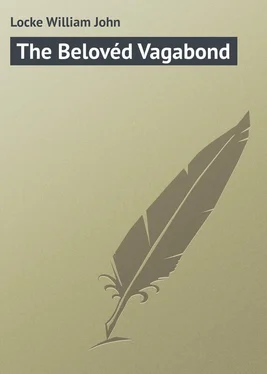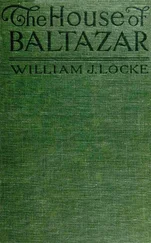William Locke - The Belovéd Vagabond
Здесь есть возможность читать онлайн «William Locke - The Belovéd Vagabond» — ознакомительный отрывок электронной книги совершенно бесплатно, а после прочтения отрывка купить полную версию. В некоторых случаях можно слушать аудио, скачать через торрент в формате fb2 и присутствует краткое содержание. ISBN: , Жанр: foreign_prose, на английском языке. Описание произведения, (предисловие) а так же отзывы посетителей доступны на портале библиотеки ЛибКат.
- Название:The Belovéd Vagabond
- Автор:
- Жанр:
- Год:неизвестен
- ISBN:http://www.gutenberg.org/ebooks/28489
- Рейтинг книги:5 / 5. Голосов: 1
-
Избранное:Добавить в избранное
- Отзывы:
-
Ваша оценка:
- 100
- 1
- 2
- 3
- 4
- 5
The Belovéd Vagabond: краткое содержание, описание и аннотация
Предлагаем к чтению аннотацию, описание, краткое содержание или предисловие (зависит от того, что написал сам автор книги «The Belovéd Vagabond»). Если вы не нашли необходимую информацию о книге — напишите в комментариях, мы постараемся отыскать её.
The Belovéd Vagabond — читать онлайн ознакомительный отрывок
Ниже представлен текст книги, разбитый по страницам. Система сохранения места последней прочитанной страницы, позволяет с удобством читать онлайн бесплатно книгу «The Belovéd Vagabond», без необходимости каждый раз заново искать на чём Вы остановились. Поставьте закладку, и сможете в любой момент перейти на страницу, на которой закончили чтение.
Интервал:
Закладка:
After having sold the books for a few shillings in Holywell Street, we marched up Fleet Street into the City, and entered a stupendous, unimagined building which Paragot informed me was his bank. Elegant gentlemen behind the counter shovelled gold to and fro with the same casual indifference as I had seen grocers' assistants shovel tea. One of them, a gorgeous fellow wearing a white piqué tie and a horse-shoe pin, paid such deference to Paragot that I went out prodigiously impressed by my master's importance. I was convinced that he owned the establishment, and during the next quarter of an hour I could not speak to him for awe.
It was about two o'clock when we reached Victoria Station. There Paragot discovered, for the first time, that there was not a train till nine in the evening. It had not occurred to him that trains did not start for Paris at quarter of an hour intervals during the day.
"My son," said he, "now is the time to make practical use of our philosophy. Instead of heaping vain maledictions on the Railway Company, let us deposit our luggage in the cloak room and take a walk on the Thames Embankment."
We walked thither and sat on a vacant bench beside the Cleopatra's Needle. It was a warm May afternoon. My young mind and body fired by the excitements of the day found rest in the sunny idleness. It was delicious to be here, instead of washing up plates and dishes with Mrs. Housekeeper. Paragot took off his old slouch hat, stretched himself easefully and sighed.
"I am anxious to get to Paris to consult Henri Quatre."
"Who is Henri Quatre, Master?" I asked.
"Henri Quatre is on the Pont Neuf. That is a French saying which means that Queen Anne is dead. He was a great King of France and his statue on horseback is in the middle of a great bridge across the Seine called the Pont Neuf. He is a great friend of mine. I will tell you a story. Once upon a time there lived in Paris a magnificent young man who thought himself a genius. He was a genius, my little Asticot. A genius is a man who writes immortal books, paints immortal pictures, rears immortal buildings and commits immortal follies. Don't be a genius, my son, it isn't good for anybody. Well, this young man was clad in purple and fine linen and fared sumptuously every day. He also had valuable furniture. One evening something happened to annoy him."
Paragot paused.
"What annoyed him?" I asked.
"A flaw in what he had conceived to be the scheme of the universe," replied my master. "It annoys many people. The young man being annoyed, cast the fruits of his genius into the fire, tore up his purple and fine linen and smashed his furniture with a Crusader's mace which happened to be hanging by way of an ornament on the wall. It's made of steel with a knob full of spikes, and weighs about nine pounds. I know nothing like it for destroying a Louis Quinze table, or for knocking the works out of a clock. If you're good, my son, you shall have one when you grow up."
I looked gratefully at him. Not content with his kindness to me then, he would be my benefactor still when I reached manhood.
"The young man then packed a valise full of necessaries and went out into the street. It was a rainy November evening. He walked along the quays through the lamp-lit drizzle till he came to the statue of Henri Quatre. The Pont Neuf was alive with traffic and the swiftly passing lights of vehicles threw conflicting gleams over the wet statue. The gas-lamps flickered in the wind." Paragot flickered his long fingers dramatically, to illustrate the gas-lamps. "On all sides rose vague masses of building – the Louvre away beyond the bridge, the frowning mass of the Conciergerie – the towering turrets of Notre Dame – swelling like billows against the sky. Pale reflections came from the river. Do you see the picture, my little Asticot? And the young man clutched the railings that surround the plinth of the statue, and caught sight of the face of Henri Quatre, and Henri Quatre looked at him so kindly that he said: ' Mon bon roi , you are of the South like myself: I am leaving Paris to go into the wide world, but I don't know where in the wide world to go to.' And the King nodded his head and pointed to the Gare de Lyon. And the young man took off his hat and said, ' Mon bon roi , I thank you!' He went to the Gare de Lyon and found a train just starting for Italy. So he went to Italy. I have a great respect for Henri Quatre."
"And what happened to him then, Master?" I asked, after a breathless pause.
"He became a vagabond philosopher," replied Paragot, refilling his porcelain pipe.
No argument has ever been able to convince Paragot that the statue did not nod its head and point the way to Italy. For some years I myself believed it; but at last it became obvious that the flashing gleams of light over the wet statue had made him the victim of a trick of the eyes. I think the only serious offence I ever gave Paragot was when I presented to him this solution of the mystery.
Varied discourse and a meal in a Strand eating-house filled up the hours till nine o'clock. And then I started for Wonderland with Paragot.
We stayed in Paris but two days. When I asked my master why our sojourn was not longer, he said something about the "bitter-sweet" of it, which I could not understand. I have only two clear memories of Paris. He took me to see Henri Quatre, and explained how the statue nodded and how the hand which held the reins lifted and pointed to the Gare de Lyon. What more conclusive proof of his veracity need I have than actual confrontation with Henri Quatre? The other scene fixed on my mind is a narrow dark street with tall houses on either side; an awning outside a humble café; a little table beneath it at which Paragot and myself were seated. I sipped luxuriously a celestial liquor which I have since learned was grenadine syrup and water; in front of Paragot was a curious opalescent milky fluid of which he drank great quantities during those two days and ever afterwards.
"The time has come," said he, rolling his eyes at me with an awful solemnity and speaking in a thick voice, "the time has come to talk of affairs. First let me impress on you that Henkendyke is an appellation offensive to French ears. Henceforward my name is Pradel – Polydore Pradel. And as it is necessary for you to have an état civil , I hereby adopt you as my son. Your name is therefore Asticot Pradel. I hope you like it. You have never known what it is to have a father. Now the possession of a father is a privilege to which every human being has a right. I, Polydore Pradel, confer on you that privilege. My son – "
He raised his glass, clinked it against mine and pledged me.
"Henceforward," said Paragot, "what is good enough for me will I hope not be good enough for you, and what is too bad for me shall never be your portion. I swear it by the devil that dwells in this entrancing but execrated form of alcohol."
He finished his drink and called for another. As soon as the absinthe had curdled with the dropping water, he filled up the glass and drank it off. Then he sat for a long time in bemused silence, while I, perched on my chair, reflected on his great goodness and wondered how I should help him up the darksome stairs of our hotel without the aid of Cherubino.
The next day we started on our pilgrimage. Why we went in one direction more than another, why we went to one place rather than to another, neither he nor I could tell. I never questioned. Sometimes we wandered for days on foot, sleeping in village inns or farm-houses – occasionally under a hedge when the nights were warm. Sometimes we spent two or three days in an old world town, and Paragot would show me cathedrals and churches and lecture me on the history of the place, and set me to sketch bits of the picturesque that took his fancy. In the cool, exquisite cloister of the Chateau of Jacques Cœur at Bourges I learned more of the history of Charles VII than any English boy of my generation. In the Chateau of Blois, the salamanders of François Premier, the statue of Diane de Poictiers, the poison cabinet of Catherine de Medici, the dungeons of the Cardinal de Lorraine, became living testimonies of the past under Paragot's imaginative teaching. He had set his heart on educating me; suddenly as the original impulse had seized him, yet it lasted strong and became the object of his disordered and otherwise aimless life. Books we always had in plenty. Tattered classics are cheap enough in France, and what mattered it if pages were missing? When done with we threw them away. We might have been tracked through the country, like the hares in a paper chase, by the trail of literature we left behind us.
Читать дальшеИнтервал:
Закладка:
Похожие книги на «The Belovéd Vagabond»
Представляем Вашему вниманию похожие книги на «The Belovéd Vagabond» списком для выбора. Мы отобрали схожую по названию и смыслу литературу в надежде предоставить читателям больше вариантов отыскать новые, интересные, ещё непрочитанные произведения.
Обсуждение, отзывы о книге «The Belovéd Vagabond» и просто собственные мнения читателей. Оставьте ваши комментарии, напишите, что Вы думаете о произведении, его смысле или главных героях. Укажите что конкретно понравилось, а что нет, и почему Вы так считаете.












